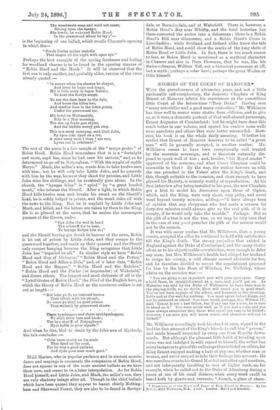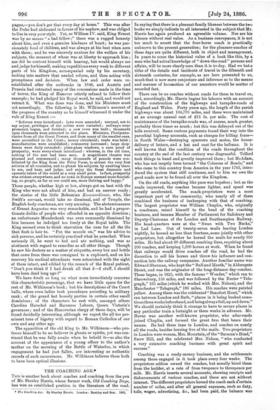STORIES OP TLIE COURT OF HANOVER.*
WITH the garrulousness of advancing years, and not a little pardonable self-complacency, the domestic Chaplain of King Ernest of Hanover relates his experiences at the punctilious little Court of the before-time "Tory Duke." Having seen "many notorieties and a good many curiosities," Mr. Wilkinson has done well to rescue some stories from oblivion, and to give us, as it were, a domestic portrait of that well-abused personage, Ernest Augustus of Cumberland ; but he might have done this much better in one volume, and spared his readers some well- worn anecdotes and others that were better unrecorded. How- ever, his book is on the whole fairly amusing. Whether his verdict that Ernest of Hanover deserves to be called " a great man" will be generally accepted, is another matter. Mr. Wilkinson seems to have been exceptionally well treated by the eccentric sovereign, and is therefore naturally dis- posed to speak well of him ; and, besides, "his Royal master" approved of his sermons, and what Court Chaplain could be insensible to that ? By the way, the author favours us with the one preached in the Palace after the King's death, and this, though suitable to the occasion, and short enough to have pleased his Majesty, is scarcely worthy of reproduction. At his first interview after being installed in his post, the new Chaplain got a hint to model his discourses upon those of Ogden, which, said the King, were very short, very pithy, and never went beyond twenty minutes, adding,—" I have always been of opinion that any clergyman who had made a sermon for forty-five minutes could always give us the real pith of it in twenty, if he would only take the trouble." Perhaps. But as the pith of a tree is not the tree, so we may be very sure that in the case of any great preacher the pith of the sermon would not be the sermon.
It was with many qualms that Mr. Wilkinson, then a young curate, accepted the office he continued to hold with satisfaction till the King's death. The strong prejudice that existed in England against the Duke of Cumberland, and the many stories afloat as to his objectionable eccentricities, were enough to deter any man; but Mrs. Wilkinson's health had obliged her husband to resign his curacy, a cold climate seemed advisable for her, and he therefore decided to accept the appointment procured for him by the late Dean of Windsor, Dr. Wellesley, whose advice on the occasion was :—
" You are going to an important post with your eyes open. Carry a bold front, be straightforward as a man, and you'll get on. As Waterloo was said by the Duke of Wellington to have been won in the playing-fields, so, no doubt, Eton will stand you in good stead. You've not been captain of the school, and foremost in the shooting- fields and at the wall for nothing. You must speak before Kings, and not be ashamed or afraid. You have heard, perhaps, that William IV. said, Ernest is not a bad fellow, but if any one has a corn, he is sure to tread on it.' You must never walk as if you had a corn, and you must always remember that those who crawl are sure to be kicked ; however, I am sere you will never crawl, and therefore will not he kicked."
Mr. Wilkinson accordingly took his stand at once, nipped in the bud the first attempt of the King's friends to call him " parson," and made himself respected by every one from Royalty down- wards. But although the pleasant little habit of treading upon corns was not indulged in with regard to himself, the writer has many instances to give of the sufferings thus inflicted on others, for King Ernest enjoyed making a butt of any one, whether man or woman, and never seemed to take their feelings into account. He was merciless even to his Grand Marshal and other aged courtiers, and not infrequently insulting to men of higher rank, as, for example, when he called out to the Duke of Altenburg during a pause at one of his small dinners, when every word could be heard both by guests and servants, " Joseph, a glass of chain-
• Reminiseen Ts of the Court and Times of King Ernest of Hanover. By the Rtv. C. Allix 31.A. 2 volt. London : Buret and Blaokett.
pagne,—yon don't get that every day at home." This was after the Duke had abdicated in favour of his nephew, and was obliged to live in very poor style. Yet, as William IV. said, King Ernest was by no means " a bad fellow ;" there was a rugged honesty about him, and even a genuine kindness of heart; he was pas- sionately fond of children, and was always at his best when seen with them ; and he was sincerely anxious for the welfare of his subjects, the meanest of whom was at liberty to approach him ; nor did he content himself with hearsay, but would always see and judge for himself, making expeditions every week to different parts of his Kingdom, accompanied only by his secretary, looking into matters that needed reform, and then acting with promptness and decision. When law and order were re- established after the outbreaks in 1848, and Austria and Prussia had retracted many of the concessions made in the time of terror, the King. of Hanover utterly refused to follow their example ; he had pledged his Royal word, he said, and would not retract it. What was done was done, and his Ministers must act accordingly. The following is Mr. Wilkinson's account of the progress of the country as he himself witnessed it under the rale of King Ernest :—
" Reforms were introduced ; laws were amended ; unequal, not to say unjust, privileges of the nobles were curtailed ; railways were promoted, begun, and finished ; a new town was built ; thousands upon thousands were attracted to the place. Ministers, Plenipoten- tiaries from all the Great Powers, and from many of the smaller ones, were accredited to the Court; money circulated ; trade was brisk ; manufactories were established ; commerce increased ; large shop- fronts were daily extended ; plate-glass windows, a sure proof of prosperity, were everywhere introduced : whereas, in the old time, nothing of the sort bad been seen. A magnificent theatre was planned and commenced ; many thousands of pounds were con- tributed by the King from the Privy Purse, to attract the very first artistes of all countries, and to please his subjects, by enabling them to see, and hear, and judge, and enjoy the finest dramatic and operatic talent of the world at a very small price. In fact, prosperity was evident everywhere, and no town in Europe seemed more flourish- ing, no people, as far as one could see, more thriving and happy."
Those people, whether high or low, always got on best with the King who were not afraid of him, and had an answer ready ; the stories of the little Bohemian .Kammerdiener, who, like Swift's servant, would take no dismissal, and of Temple, the English body-coachman, are very amusing. The abstemiousness of Ernest Augustus was very remarkable, and he had a propor- tionate dislike of people who offended in an opposite direction ; an unfortunate Mnndschenk was even summarily dismissed by him because he indulged too freely at the Royal table. The King seemed even to think starvation the cure for all the ills that flesh is heir to. "Put the muzzle on," was his advice to sick persons, and he certainly practised what he preached. When seriously ill, he wont to bed and ate nothing, and was as abstinent with regard to remedies as all other things. Though he saw his doctors as a matter of etiquette, every box and bottle that came from them was consigned to a cupboard, and on his recovery his medical attendants were astonished with the sight of them intact, and edified by the remark of the Royal patient, "Don't you think if I had drank all that d—d stuff, I should have been dead long ago ?"
We have dwelt so long on what more immediately concerns this characteristic personage, that we have little .space for the rest of Mr. Wilkinson's 'book ; but his descriptions of the Court balls, where even ladies took precedence according to military rank ; of the grand but homely parties in certain other small dominions ; of the characters he met with, amongst others Caroline Herschel and Baroness Lehzen, Queen Victoria's governess ; and of the Hanoverian clergy of those days, will be found decidedly interesting, although we regret the all too pro- minent tone of bigotry with regard to Roman Catholics of our own and any other age.
The apparition of the old King to Mr. Wilkinson—who pro- fesses himself to be no believer in ghosts or spirits, yet was con- vinced that he was fully awake when he beheld it—as also the account of the appearance of a young officer to the author's mother on the morning of the Battle of Waterloo, in which engagement he had just fallen, are interesting as authentic records of such occurrences. Mr. Wilkinson believes them both to have been optical illusions.



































 Previous page
Previous page